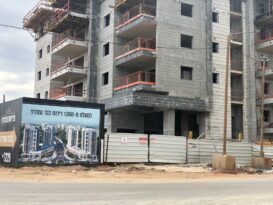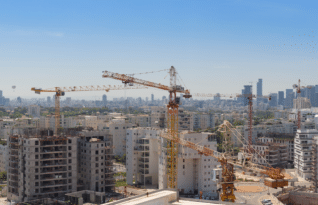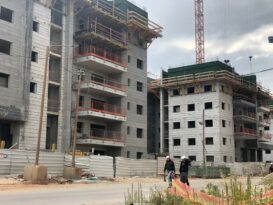To what extent will the political crisis in Israel affect the housing market? Will rising interest rates lead to a drop in home prices? How can Israel absorb tens of thousands of new immigrants? and is now the time to purchase a home in Israel? On the Eve of Passover 5782, Buyitinisrael asks four challenging questions about the Israeli real estate market — and attempts to answer them.
As we approach the holiday of Passover, it seems that two plagues that currently characterize the State of Israel – political instability and a steady increase in home prices – will not be easily wiped out. These are added to the challenges that the Covid-19 pandemic has brought, and the fresh blow that landed on humanity about a month and a half ago in the form of a cruel war in Eastern Europe. This tragic situation has brought thousands of immigrants to Israel for whom housing solutions must be provided. In order to shed some clarity and make sense of the Israeli real estate market, we formulated four questions, and answers, on the subject:
1. To what extent will the political crisis affect the real estate market?
The intuitive answer to this question is that the political crisis is likely to have a negative impact on the government’s ability to curb housing prices. As we know, the real estate market remains stable in an environment in which there is certainty and stability, and therefore, the breakdown of the government does not bode well.
But a closer look at things may lead to a different conclusion. If we look at the plan set out to control housing prices presented by the Ministers of Finance, Interior, and Housing last October, we find that most of the clauses included in it have actually been implemented. The purchase tax on real estate investors has been raised, the discounted housing program has been launched with no reason why it should not continue on a high scale, even under a transitional government, and various barriers to urban renewal developments have been removed.
The measures that have not yet been approved come under the plan of Finance Minister Lieberman recently presented to allocate all apartments to be built on state land at a discount to first home buyers. This plan, in any case, was arguably unrealistic and it is doubtful that it would have been passed anyway. The bottom line is that the Bank of Israel’s decision this week to increase the interest rate will affect home prices more than any decision made in the political system.
2. How can Israel absorb tens of thousands of immigrants from Ukraine and Russia?
On the face of it, Israel is doing all the right things for the new wave of immigration. On Sunday, the government approved a grant for all immigrants from Ukraine intended to help them with rent, which stands at NIS 2,300 per month for singles, and up to NIS 3,400 per month for a family, for a period of 12 months, in addition to the “absorption basket” payments.
Last week, the National Planning and Building Council approved the promotion of a new national outline plan for the absorption of immigrants from Ukraine and Russia, which considers the arrival of about 150,000 people from these countries. The plan includes the construction of temporary caravan sites in areas designated for development, as well as housing the immigrants in vacant apartments in existing localities.
While finding temporary housing solutions is most pressing now, the real challenge for the government will be over the next two to three years when they will have to successfully integrate the immigrants into Israeli society, something that will require employment solutions, education, social services, and of course a sufficient number of apartments. In the early 1990s, Housing Minister Ariel Sharon knew how to quickly prepare for the absorption of one million immigrants. In the current era, however, our expectations are much lower, as we settle for a functioning government.
3. Will Israel’s real estate prices continue to rise?
On the one hand, the Bank of Israel’s announcement this week of an interest rate hike is expected to increase mortgage rates and, subsequently, cool the Israeli real estate market. On the other hand, there is still a strong demand for apartments that traditionally exceeds the supply available, and therefore pushes home prices upwards. Which of the two market forces is likely to win? This is the million-dollar question that everyone is asking.
But if we take an informed bet, it seems that for now, the interest rate cut announced this week, intended to curb price increases, will not stop home prices from rising altogether but rather will reduce the rate of increase. At the current interest rate, we don’t expect to see another annual increase of 13%, or even 10%, in home prices but we do expect to see an increase in prices at a more moderate rate of 5-6%. However, if there are additional increases in the Bank of Israel interest rate later in the year, the picture may change more dramatically, to the point of a complete halt in price increases.
4. Is now the right time to purchase a home in Israel?
The rise in interest rates this week has indeed created an atmosphere of uncertainty in the market and anticipation of the end of the sharp price increases that have characterized it over the past year and a half. However, a study of historical patterns shows that overall real estate prices in Israel rise significantly in the long run. Once every few years, there is a “correction” in the form of a moderate price drop, which is usually followed by sharp price rises.
Since home prices in Israel are already very high, for those that have been considering purchasing an apartment it is a good time to do so now, for in the future prices may be considerably higher and homes unaffordable to those same buyers. Speaking to any real estate agent in Modi’in, for example, you will quickly hear about an increase of close to 50% in the price of private homes in the city, as has occurred in Ramat Hasharon too. Many of those who hesitated about a year ago on purchasing in these cities are no longer able to afford to purchase private homes in these places. So, if you seriously want to buy a property and can afford to pay the current prices, our advice is to purchase sooner, rather than later, when you may be priced out of the Israeli real estate market.
As always, Buyitinisrael is here to assist you in purchasing a home in Israel, contact us whenever you’re ready.








